DDes Student Bios
Harvard Doctor of Design students constitute a group of select students with a great variety of research interests. The program is intended for persons who wish to enter teaching, research and advanced careers in the theory and practice of architecture, landscape architecture, urban form and technology; or the analysis and development of cities, landscapes and regions with emphasis on social, economic, ecological, transportation and infrastructural systems. Further, students may wish to conduct research in the area of digital technologies within such context.
In addition to their studies, doctoral candidates are involved in many aspects of the school. Among other activities, they hold Research or Teaching Fellowships and organize speaker series, conferences,and journals.
Click here for recent DDes graduates.
 Maryam Aljomairi is a Bahraini architect and researcher with interests in programmable material systems, building technology, and personal fabrication. Maryam is currently a third-year doctoral student and teaching fellow at Harvard University. At Harvard, she is researching carbon mineralization to develop and program carbon negative structures as part of the Aizenberg Lab & MaP+S Group.
Maryam Aljomairi is a Bahraini architect and researcher with interests in programmable material systems, building technology, and personal fabrication. Maryam is currently a third-year doctoral student and teaching fellow at Harvard University. At Harvard, she is researching carbon mineralization to develop and program carbon negative structures as part of the Aizenberg Lab & MaP+S Group.
She received an MS in Design & Computation from MIT (2022) and a BArch from the American University of Sharjah (2017). Professionally, she has worked at the offices of Diller Scofidio + Renfro, Studio Anne Holtrop, and Benoy. Most recently, Maryam co-curated Bahrain’s National participation, Sweating Assets, at the Venice Architecture Biennale 2023.
http://www.maryamaljomairi.com/
 Alexander Augustus is an artist, designer, and writer. He creates public experiences that blend traditional and digital media, including bronze-casting, fashion, illustration, audio, film, and theatre, alongside CAD, apps and computer games. Driven by a fascination with society, storytelling, and contemporary mythology, he has collaborated with diverse individuals, from performers and politicians to bank robbers and stem cell engineers.
Alexander Augustus is an artist, designer, and writer. He creates public experiences that blend traditional and digital media, including bronze-casting, fashion, illustration, audio, film, and theatre, alongside CAD, apps and computer games. Driven by a fascination with society, storytelling, and contemporary mythology, he has collaborated with diverse individuals, from performers and politicians to bank robbers and stem cell engineers.
Alexander’s research concerns public monument design, having installed permanent sculptures across Europe, Asia, and America, focusing on city planning and participatory approaches. He has held solo exhibitions at Somerset House and Seoul Museum of Art, and exhibited at Tate Modern and Asia Culture Centre, with work archived at the National Portrait Gallery. He has been featured in Frieze Magazine, Art Monthly, The Verge, Channel 4, KBS, and MBC. In 2012, Alexander co-founded a public design studio, creating for global clients such as O2, KAIST, Eurostar, and the cities of London, Maribor, Marseilles, and Jesolo.
Alexander formerly lectured Environmental Design at the University for the Creative Arts (UK) and Xiamen University (China). He holds master’s degrees in Spatial Design and Education from Central Saint Martins and The University of Cambridge and a joint honours degree in Anthropology, Archaeology, and Art History from the University of East Anglia. He is now a first-year Doctoral student at Harvard GSD.
[email protected]
www.alexanderaugustus.com
Instagram: @alexander.augustus_
 Hamed Bukhamseen is an architect and a fourth-year doctoral candidate. His research is concerned with the developmental projects undertaken by sovereign wealth funds and their socio-political impact within their host nations. Previously, he has worked as an architect in Germany, Japan, and the US, and as an instructor at the Kuwait University – College of Architecture where he taught design studios and seminars. Parallel to his time teaching, Hamed co-founded the architectural office Civil Architecture. The work of Civil has been shown in the Sharjah Architecture Triennial, the Oslo Architecture Triennale, the Seoul Biennale for Architecture and Urbanism, Expo 2020, and at the CAC in Cincinnati. He is the co-author of “Foreign Architecture/Domestic Policy” (Humboldt Books, 2022) and the upcoming Graham Foundation funded “Two Thousand Years of Non-Urban History” (Kaph Books, 2025). Alongside Ali Ismail Karimi, he curated the Kuwait Pavilion at the 2016 Venice Architecture Biennale.
Hamed Bukhamseen is an architect and a fourth-year doctoral candidate. His research is concerned with the developmental projects undertaken by sovereign wealth funds and their socio-political impact within their host nations. Previously, he has worked as an architect in Germany, Japan, and the US, and as an instructor at the Kuwait University – College of Architecture where he taught design studios and seminars. Parallel to his time teaching, Hamed co-founded the architectural office Civil Architecture. The work of Civil has been shown in the Sharjah Architecture Triennial, the Oslo Architecture Triennale, the Seoul Biennale for Architecture and Urbanism, Expo 2020, and at the CAC in Cincinnati. He is the co-author of “Foreign Architecture/Domestic Policy” (Humboldt Books, 2022) and the upcoming Graham Foundation funded “Two Thousand Years of Non-Urban History” (Kaph Books, 2025). Alongside Ali Ismail Karimi, he curated the Kuwait Pavilion at the 2016 Venice Architecture Biennale.
Hamed is a graduate of the Rhode Island School of Design and the Harvard Graduate School of Design, earning degrees in fine arts, architecture, and urban design. He was recently a visiting research associate at the London School of Economics Cities program.
 Yona Chung is an architect, urban designer and a third-year doctoral candidate. Her research focuses on the space-time dynamics and reciprocity between lifestyle and built environment, addressing the concept of resiliency and flexibility in today’s anthropocentric climate. Her work has been supported by the Harvard Korea Institute, the Harvard Real Estate Grant, the Dean’s Merit Award, among others.
Yona Chung is an architect, urban designer and a third-year doctoral candidate. Her research focuses on the space-time dynamics and reciprocity between lifestyle and built environment, addressing the concept of resiliency and flexibility in today’s anthropocentric climate. Her work has been supported by the Harvard Korea Institute, the Harvard Real Estate Grant, the Dean’s Merit Award, among others.
Prior to joining the Doctor of Design (DDes) program, Yona worked at multiple design and planning agencies of different scopes and scales, including Skidmore, Owings & Merrill and more recently, as an associate urban designer at Grayscale Collaborative. Key projects she contributed to include the Burlington Racial Equity Roadmap, PLAN Mattapan, 2020 Massachusetts Census Complete Count campaign, and the Olmsted Now Committee of Neighborhoods, which received the Jury Special Recognition Award for Outstanding Social Impact from the 2024 BSLA Awards.
Yona graduated from the Harvard Graduate School of Design in 2019 with a Master of Architecture in Urban Design degree and also holds a Bachelor of Architecture degree from the Illinois Institute of Technology. She continues to pursue her passion for research and design through teaching and publications. Recently, she co-authored the book ‘Design Thinking and Storytelling in Achitecture’ (Birkhauser, 2024) with Peter G. Rowe, and currently working on the forthcoming book ‘The Metabolism of Settlement Coexistences’ (ORO, 2025).
 Cameron Contreras is a Design Research Lead at CannonDesign and a second-year Doctor of Design student at Harvard’s Graduate School of Design. Her research focuses on human experiences in ‘phygital’ spaces; immersive intersections of the built environment and the virtual world.
Cameron Contreras is a Design Research Lead at CannonDesign and a second-year Doctor of Design student at Harvard’s Graduate School of Design. Her research focuses on human experiences in ‘phygital’ spaces; immersive intersections of the built environment and the virtual world.
Prior to joining the DDes program, Cameron worked as a Strategy Consultant with Blue Cottage of CannonDesign, helping architects better understand people by translating data into design direction. She also founded the firm’s Research Practice and served as Interim Research Director.
Her work revolves around maximizing the human condition by scientifically exploring relationships with our surroundings. She has published eight articles and presentations in the past four years on several environmental psychology, ergonomics, and architectural industry topics, also serving as peer-reviewer for these journals and organizations.
Cameron holds a Master of Science (M.S.) in Environmental Psychology, with a minor in Information Science, from Cornell University, where she conducted empirical research on dyadic collaboration effectiveness in mixed reality (MR) and virtual reality (VR). She also holds a Bachelor of Arts (B.A.) in Psychology and Environmental Policy, with a minor in Human Services Management, from Illinois Wesleyan University (IWU). She has advised students in research methods, served as a Teaching Assistant at Cornell, and as a Research Assistant at IWU.
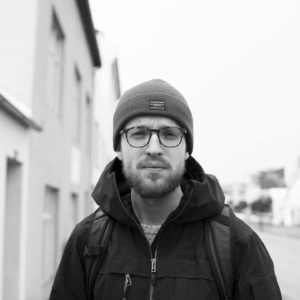 Bert De Jonghe is a fourth-year Doctor of Design candidate and a Lecturer in Landscape Architecture at Harvard GSD. His dissertation combines a granular understanding of the spatial implications of multinational occupation in the high-Arctic archipelago of Svalbard with a critique of the Norwegian nationalism underlying the Svalbard project.
Bert De Jonghe is a fourth-year Doctor of Design candidate and a Lecturer in Landscape Architecture at Harvard GSD. His dissertation combines a granular understanding of the spatial implications of multinational occupation in the high-Arctic archipelago of Svalbard with a critique of the Norwegian nationalism underlying the Svalbard project.
Bert is the founder of Transpolar Studio, a design practice specializing in landscape architecture, urbanism, and design research in the Arctic regions. He has worked as a designer at a range of landscape architecture practices worldwide, including in Belgium, South Africa, and Norway, and as a research assistant at Harvard GSD’s Office for Urbanization.
He’s been fortunate to serve in several teaching positions, including University Lecturer at the Arctic University of Norway in Tromsø and Teaching Fellow, Teaching Assistant, and Research Tutor roles at Harvard GSD. He has been invited to be a critic/reviewer in numerous design courses and studios, including at Harvard GSD, Northeastern University, and Yale University.
He holds degrees from Harvard GSD (Master in Design Studies), the Oslo School of Architecture and Design (Master of Landscape Architecture), and the School of Arts in Ghent (Bachelor of Landscape and Garden Architecture).
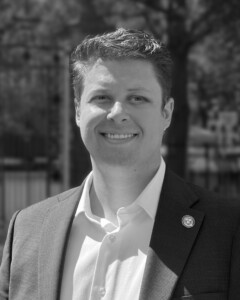 Duke Dunham is a first-year student in the Doctor of Design program. Duke is an Architect and Urban Designer originally from Boulder, Utah. His work centers around the global transition away from fossil fuels with a focus on transitioning energy and food systems through the creation of actionable design solutions and the development of new forms of governance to combat the climate crisis.
Duke Dunham is a first-year student in the Doctor of Design program. Duke is an Architect and Urban Designer originally from Boulder, Utah. His work centers around the global transition away from fossil fuels with a focus on transitioning energy and food systems through the creation of actionable design solutions and the development of new forms of governance to combat the climate crisis.
Duke is a co-founder of NoWhere, a company founded on the premise that climate change demands urgent transformations to the systems that organize the world. NoWhere is working to re-center sociological relationships to consumption, production, and infrastructure. NoWhere is currently responding to these issues through the design of sustainable food systems, energy systems, and habitats across a variety of scales and disciplines.
Duke holds a Bachelor of Architecture (B.Arch) and a minor in Business from the Marshall School of Business at the University of Southern California and a Master of Architecture in Urban Design (MAUD) from the Harvard Graduate School of Design. His master’s thesis looked at an urban coastal refinery in Los Angeles that has been slated for decommissioning by 2045. In his proposal, the existing refinery was transitioned to support natural methods of carbon sequestration. Using phytoremediation strategies to begin to clean the soil and transition the cultural relationship of this site within the city. These phytoremediation strategies were then used to inform and guide future redevelopment and zoning strategies across the site as the oil industry scales back production.
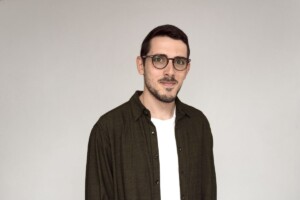 Marco Fiorino is an architect and designer whose research focuses on landscape and urbanism. His current work at the GSD examines the historical transformation of landscape practices in rural areas, using ethnographic methods to understand how socio-economic shifts, infrastructure changes, and conservation approaches impact human-environment relationships over time.
Marco Fiorino is an architect and designer whose research focuses on landscape and urbanism. His current work at the GSD examines the historical transformation of landscape practices in rural areas, using ethnographic methods to understand how socio-economic shifts, infrastructure changes, and conservation approaches impact human-environment relationships over time.
He has both taught and practiced architecture in the United Kingdom, serving as an Associate Lecturer at Norwich University of the Arts (2022-2024), where he co-led the final-year architecture undergraduate design course with a focus on the East Anglian coast. He has also taught design studios and history and theory courses at the Leicester School of Architecture, DMU (2020-2024). In practice, Marco has worked with the environmental design firm Architype Architects, focusing on public projects in rural and coastal environments, as well as with smaller firms concentrating on conservation and heritage projects.
As a Research Council Scholar at the University of Cambridge, Marco conducted a two-year research project on landscape practices in the Wye Valley on the Welsh-English border, earning the Alexander Pike Prize for Sustainable Technology. He graduated at the top of his class with an MPhil in Architecture and Urban Design from the University of Cambridge. He also holds a BA (Hons) in Architecture from the Leicester School of Architecture, DMU, where he received the William Key Fund for highest undergraduate achievement. Both his undergraduate and graduate projects were nominated for the RIBA President’s Medals.
He is currently a first-year doctoral student.
 Vanessa Harden is a fourth-year candidate in the Doctor of Design program. She is an artist and designer focused on creating thought-provoking experiences and installations in the built environment. Her research focuses on how mycorrhizal networks facilitate plant connectivity in cities. She is developing tools and methodologies to help support the fitness and functions of urban ecosystems by incorporating healthy soil fungal communities and networks into the design of urban environments.She is the founder of Subversive Gardener, an IF Concept Award winning design project turned non-profit organization that focuses on environmental education, design exploration, and public intervention connected to the guerrilla gardening subculture. Vanessa is also the founder of Wild Flag Studios, a design studio that creates interactive sculptures and produces art installations for clients worldwide.
Vanessa Harden is a fourth-year candidate in the Doctor of Design program. She is an artist and designer focused on creating thought-provoking experiences and installations in the built environment. Her research focuses on how mycorrhizal networks facilitate plant connectivity in cities. She is developing tools and methodologies to help support the fitness and functions of urban ecosystems by incorporating healthy soil fungal communities and networks into the design of urban environments.She is the founder of Subversive Gardener, an IF Concept Award winning design project turned non-profit organization that focuses on environmental education, design exploration, and public intervention connected to the guerrilla gardening subculture. Vanessa is also the founder of Wild Flag Studios, a design studio that creates interactive sculptures and produces art installations for clients worldwide.
Vanessa and her work have been featured in publications including Vogue, The Guardian, Wired, Bloomberg BusinessWeek, Vice, and others, and on networks including CNN and the BBC. Her work has been shown in multiple exhibitions including at the Venice Biennale, the Victoria and Albert Museum, and the Royal Institution. She has delivered numerous talks about her work, addressing how public interventions act as vehicles that draw awareness to timely social and environmental challenges.
She holds three art and design centric degrees from the Ontario College of Art & Design (BDes), MIT Media Lab and the Royal College of Art (MA RCA).
 Chenming He is a first-year DDes student at Harvard Graduate School of Design (GSD). His interests focus on computational design and digital fabrication, mainly leveraging generative algorithms to enhance design possibilities and building performance.
Chenming He is a first-year DDes student at Harvard Graduate School of Design (GSD). His interests focus on computational design and digital fabrication, mainly leveraging generative algorithms to enhance design possibilities and building performance.
He graduated from Cornell University with a Master of Science in Design Technology, where his thesis centered on using performance-driven computational methods to revitalize vernacular architecture in rural areas. At Sabin Lab, under Jenny E. Sabin’s guidance, his research included programmable materials and bio-inspired design.
Before his master’s degree, Chenming earned a Bachelor of Architecture from Chongqing University, China. He gained significant professional experience as an Intern Architectural Designer at East China Architectural Design & Research Institute, working on large-scale transportation projects, and as a full-time Architectural Designer at AICO Design, focusing on commercial complex projects.
He has been active in academic workshops and hackathons, serving as a teaching assistant. Chenming is proficient in C#, Python, Rhino, and Grasshopper, and has developed his own Grasshopper plug-in, DeadFish.
 Johanna Hoffman is an urbanist working in the space between design, planning, fiction, and futures. She specializes in using speculative futures tools to enhance collaborative capacities in urban planning and policy development. A founder of the research and action institute Design for Adaptation, she uses strategic planning and speculative practice to help communities, cities, and organizations survey the impacts of potential futures and spur proactive adaptation. She holds an MLA in landscape architecture and environmental planning from UC Berkeley and has been a fellow at institutions including the Yerba Buena Center for the Arts, the European Futures Observatory, the Berggruen Institute, and USC. Her first book, Speculative Futures: Design Approaches to Navigate Change, Foster Resilience, and Co-Create the Cities We Need, was published in the fall of 2022. Her current research explores spatial visualization tactics to support collaborative, complex decision-making, with an emphasis on visualizing the influence of imaginaries on urban spaces across time, space, and macro environmental factors.
Johanna Hoffman is an urbanist working in the space between design, planning, fiction, and futures. She specializes in using speculative futures tools to enhance collaborative capacities in urban planning and policy development. A founder of the research and action institute Design for Adaptation, she uses strategic planning and speculative practice to help communities, cities, and organizations survey the impacts of potential futures and spur proactive adaptation. She holds an MLA in landscape architecture and environmental planning from UC Berkeley and has been a fellow at institutions including the Yerba Buena Center for the Arts, the European Futures Observatory, the Berggruen Institute, and USC. Her first book, Speculative Futures: Design Approaches to Navigate Change, Foster Resilience, and Co-Create the Cities We Need, was published in the fall of 2022. Her current research explores spatial visualization tactics to support collaborative, complex decision-making, with an emphasis on visualizing the influence of imaginaries on urban spaces across time, space, and macro environmental factors.
 Sang Won Kang is a second-year Doctor of Design student specializing in the use of artificial intelligence to optimize indoor humidity management. His research explores the intricate, non-linear relationships between humidity and various environmental factors in the form of data. By transitioning from conventional methods to an adaptive, data-driven approach, Sang seeks to not only enhance the predictability of indoor humidity levels but also to optimize indoor comfort and energy efficiency through effective and scalable humidity control.
Sang Won Kang is a second-year Doctor of Design student specializing in the use of artificial intelligence to optimize indoor humidity management. His research explores the intricate, non-linear relationships between humidity and various environmental factors in the form of data. By transitioning from conventional methods to an adaptive, data-driven approach, Sang seeks to not only enhance the predictability of indoor humidity levels but also to optimize indoor comfort and energy efficiency through effective and scalable humidity control.
Prior to joining Harvard GSD, Sang was a researcher at the Empathy in Point Clouds laboratory of Taubman College, researching manipulation and control methods of point clouds as visual data components, receiving generous grants to advance the research. Sang was also a member of the Architecture & Artificial Intelligence Laboratory, where he participated in the making of “The Doghouse”, a generative AI based design that was exhibited at the Museum of Applied Arts in Vienna in 2023. Sang has taught and led multiple courses and workshops on computational design, procedural modeling and game engines.
Sang earned his B.A. in Design from the University of California, Davis and his M.Arch with Distinction from the University of Michigan, Ann Arbor.
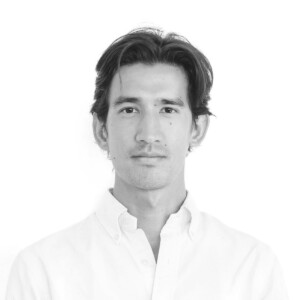 Joseph Kennedy is an interdisciplinary designer and creative technologist who works across multiple scales encompassing both natural and built environments. He is a second-year DDes student whose research leverages digital fabrication, tunable material and applied ecology to participate in the remediation of post-industrial landscapes.
Joseph Kennedy is an interdisciplinary designer and creative technologist who works across multiple scales encompassing both natural and built environments. He is a second-year DDes student whose research leverages digital fabrication, tunable material and applied ecology to participate in the remediation of post-industrial landscapes.
He is a graduate of the Media Lab at the Massachusetts Institute of Technology, where he worked in the Mediated Matter group with Neri Oxman to produce bio-fabricated structures exhibited in MoMa, SFMoMA and the Cooper Hewitt. Joe received his Bachelor of Architecture from Cornell University with a Goodwin Sands thesis prize, the Eidlitz Fellowship, and Cornell Council of the Arts Funds. Additionally, he co-taught a design-build studio at the AHO while completing his Fulbright Fellowship in Oslo.
Joe has held teaching positions at UC Berkeley, Woodbury University and the Boston Architectural College. Previously, he has worked for design firms such as Snøhetta in SF, Only If in NYC, and Miniwiz in Taipei as well as in creative roles at NASA JPL in LA, and OPT Industries in Cambridge. Currently, Joe operates a design consulting practice ARAЯA, and is a research affiliate in the Tangible Media Group at MIT.
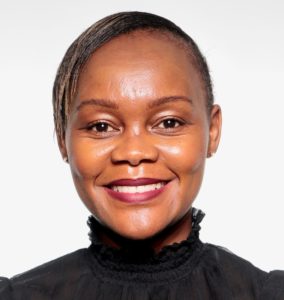 Gorata Kgafela is a Doctoral candidate at the Harvard Graduate School of Design. Her research explores the influence of the geopolitical landscape on the motivators and behavior patterns observed in participatory practice and policy formulation. Emphasis is placed on local knowledge systems as a keystone for innovation of tools for civic engagement. Specifically, her research explores the potential of gamification for an imagined spatial production and its potential as an emancipatory tool for the civic participatory process.
Gorata Kgafela is a Doctoral candidate at the Harvard Graduate School of Design. Her research explores the influence of the geopolitical landscape on the motivators and behavior patterns observed in participatory practice and policy formulation. Emphasis is placed on local knowledge systems as a keystone for innovation of tools for civic engagement. Specifically, her research explores the potential of gamification for an imagined spatial production and its potential as an emancipatory tool for the civic participatory process.
Gorata holds an MBA from the University of Pretoria’s Gordon Institute of Business Science (GIBS). She is trained as an Architect, qualifying with both an MArch and a Post Professional MArch in Computing from the University of Miami where she graduated valedictorian and was recipient of the Henry Adams Medal for Excellence in Architecture by the American Institute of Architects. Gorata received her B.A. in Architecture from Washington University in St. Louis where she graduated Magna Cum Laude.
With over 18 years as a practicing Architect and as President of Architects Association of Botswana, Gorata is a highly accomplished and multifaceted professional with expertise in architecture, design, real estate, and global business. Her teaching experience includes teaching fellowships at Harvard Graduate School of Design in Urban Economics for Planners and Policymakers (SES5495), Cases in Contemporary Construction (SCI6230), Construction Systems (SCI6123), and as a graduate teaching assistant at University of Miami.
 Jae Hyun (Jae) Kim is a doctoral student at Harvard GSD, where he studies urban planning and real estate with a focus on sustainable future mobility innovations. His research emphasizes data-driven analysis and its application to enhance inclusivity and sustainable urban mobility, particularly through the lens of mobility technology. Jae’s academic pursuits aim to explore how these elements, combined with urban policy and economic development, can create age-friendly and sustainable urban environments.
Jae Hyun (Jae) Kim is a doctoral student at Harvard GSD, where he studies urban planning and real estate with a focus on sustainable future mobility innovations. His research emphasizes data-driven analysis and its application to enhance inclusivity and sustainable urban mobility, particularly through the lens of mobility technology. Jae’s academic pursuits aim to explore how these elements, combined with urban policy and economic development, can create age-friendly and sustainable urban environments.
Throughout his academic journey, Jae has been involved in numerous research projects on mobility, working in cities such as Barcelona, Honolulu, New York, and Seoul. He has served as a researcher at academic institutions, including the Columbia Climate School, Seoul National University Graduate School of Environmental Studies, and Stanford University. Notably, Jae was a research associate on the Partnership for Research on Informal and Shared Mobility (PRISM) at the Center for Sustainable Urban Development (CSUD) and remains a student affiliate while pursuing his doctoral studies. He has been recognized as a Next Generation Scholar by the Volvo Research and Educational Foundations (VREF) through this project.
Prior to the GSD, Jae earned a M.S. in Urban Planning from Columbia University’s GSAPP, where he concentrated on urban analytics and the built environment. He also holds a B.A. in Economics from the University of California, Berkeley, with minors in City and Regional Planning and Data Science.
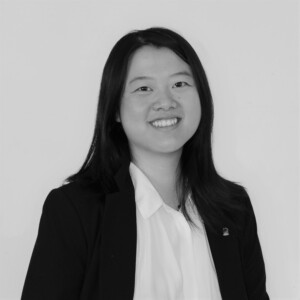 Yiwei Lyu is a second-year Doctor of Design student with an interest in building technology and simulation. With the goal to enable data-driven design and encourage passive design strategies, her research will focus on investigating the effectiveness of passive systems in the early design stage using life cycle assessment and machine learning. This research utilizes machine learning to overcome the challenge of uncertainty in the early design stage and the slow evaluation process of life cycle assessment.
Yiwei Lyu is a second-year Doctor of Design student with an interest in building technology and simulation. With the goal to enable data-driven design and encourage passive design strategies, her research will focus on investigating the effectiveness of passive systems in the early design stage using life cycle assessment and machine learning. This research utilizes machine learning to overcome the challenge of uncertainty in the early design stage and the slow evaluation process of life cycle assessment.
Prior to the GSD, she received bachelor’s degrees from University of Southern California in architecture and mathematics. In 2023, she graduated from Massachusetts Institute of Technology with a Master of Science in Architecture Studies specializing in building technology. Her master’s thesis presents a novel workflow in Grasshopper to provide early-design guidance with life cycle assessment. The tool addresses the early-stage uncertainty through random inputs with a Monte Carlo approach and implements surrogate models to accelerate the process for each iteration.
Yiwei has architecture internship experiences at von Oeyen Architects and Dosu Studio Architecture. She also worked as a research assistant at the MIT Concrete Sustainability Hub.
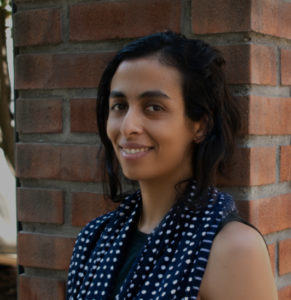 Dominique Mashini is a DDes candidate at Harvard University’s Graduate School of Design as a Fulbright Grantee. She holds a master’s degree in urban development from Pontificia Universidad Católica de Chile and is a trained architect from the same university. Dominique’s work focuses on political ecology, regional development, and climate change in Latin American and Caribbean cities. Her current research explores the formation of commodity-regions through the interplay between extractive industries and urbanization in the Atacama Desert and the Norte Grande.
Dominique Mashini is a DDes candidate at Harvard University’s Graduate School of Design as a Fulbright Grantee. She holds a master’s degree in urban development from Pontificia Universidad Católica de Chile and is a trained architect from the same university. Dominique’s work focuses on political ecology, regional development, and climate change in Latin American and Caribbean cities. Her current research explores the formation of commodity-regions through the interplay between extractive industries and urbanization in the Atacama Desert and the Norte Grande.
Previously, she was a consultant for the Housing and Urban Development (HUD) division (Climate Change and Sustainable Development Department) of the Inter-American Development Bank (IDB), where she coordinated projects for metropolitan governance and socio-environmental interventions. She also supported the IDB Southern Cone countries team in research and technical cooperations on Historic Urban Landscape (HUL) approaches and neighborhood improvement in Chilean cities.
Additionally, she was a researcher at the Urban Design Lab of the Technische Universität Wien (TU Wien), where she developed participatory methodologies for urban projects in Argentina, Chile, Costa Rica, and Panamá. Dominique has participated and continues to participate in collaborative networks for research and editorial projects such as Plataforma Urbana (ArchDaily) and Fragmentation (design studies in occupied territories and socio-spatial violence).
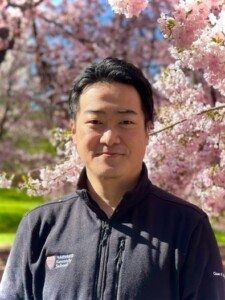 Masaki Nomura is a researcher who integrates Japanese philosophy with architecture and design. His scholarly endeavors seek to theorize Japanese non-dichotomic philosophies, focusing on the fundamental inseparability between subject-object, self-others, body-mind, time-space, human-nature, and more, embodied within the context of Japan’s architecture and design.
Masaki Nomura is a researcher who integrates Japanese philosophy with architecture and design. His scholarly endeavors seek to theorize Japanese non-dichotomic philosophies, focusing on the fundamental inseparability between subject-object, self-others, body-mind, time-space, human-nature, and more, embodied within the context of Japan’s architecture and design.
Prior to Harvard GSD and HKS, Masaki served as a national government official at Japan’s Ministry of Economy, Trade, and Industry, and the Cabinet Office, engaging in the drafting of mission-critical cabinet decisions. He then held a C-Suite position at a leading AI startup that garnered the Grand Prix at the Startup World Cup 2023, collaborating with political and business leaders including ministers. During this time, he authored a philosophy paper that bridges Japanese Zen philosophy with the concept of mindfulness and co-authored a Harvard Business School case study on Japanese management philosophy.
Drawing upon these professional experiences, he has served as an Executive Advisor for Nintendo’s Family Office and the Kyoto Institute of Philosophy, where the board members include CEOs of Japan’s premier global companies such as NTT, Hitachi, Hakuhodo, and others. Currently, as a philosophy researcher, he is the author of “Kyoto Grand Vision 2050,” a comprehensive future plan for Kyoto city, which boasts 1,200 years of history and projects into the forthcoming quarter-century, commissioned directly by the mayor.
Masaki earned an MPA from Harvard Kennedy School, an MPhil from Kyoto University majoring in philosophy, and a BA from the University of Tokyo. He was selected as a World Economic Forum’s Global Shaper and has been the recipient of many other awards and honors. Additionally, he is an adept player of Kendo, a traditional Japanese martial art of swordsmanship, with 28 years of experience, and regularly practices it in Boston and Kyoto to pursue the state of the aforementioned non-dichotomies.
https://researchmap.jp/masaki_nomura
 Dawon Oh is a third-year doctoral student at the Harvard University Graduate School of Design. Her research focuses on transportation, specifically the travel behavior and accessibility of people with different needs when they travel, such as women, caregivers, and children. Even though she holds a transportation engineer license from South Korea, she’s not a big fan of vehicle traffic; she’s more interested in active travel, including walking and cycling. Her recent research focuses on the difference in caregivers’ pedestrian route choices when escorting children to school or not. She’s also interested in the mode choices of caregivers when they are accompanied by the children, depending on the destination of the trip.
Dawon Oh is a third-year doctoral student at the Harvard University Graduate School of Design. Her research focuses on transportation, specifically the travel behavior and accessibility of people with different needs when they travel, such as women, caregivers, and children. Even though she holds a transportation engineer license from South Korea, she’s not a big fan of vehicle traffic; she’s more interested in active travel, including walking and cycling. Her recent research focuses on the difference in caregivers’ pedestrian route choices when escorting children to school or not. She’s also interested in the mode choices of caregivers when they are accompanied by the children, depending on the destination of the trip.
She’s a 2024–25 Doctoral Fellow of the Harvard Mellon Urban Initiative, and her work has been supported by the Harvard Real Estate Grant, the BK21 Government Scholarship, and others. Prior to joining the Doctor of Design (DDes) program, she worked at an engineering firm and the Seoul Metropolitan Government. She also worked as a researcher at Seoul National University’s Institute for Sustainable Development and Environmental Planning. Her previous research projects and papers are archived here: https://dawonoh.com/.
She holds a bachelor’s degree in civil engineering (BE) from Chung Ang University in Seoul, South Korea, and a master’s degree in urban planning (MUP) from Seoul National University in Seoul, South Korea. She did her PhD at Seoul National University but didn’t defend the dissertation and joined Harvard GSD.
 Ryan Otterson is an architect and second-year doctoral student. His research deals with the role of building materials in thermal mediation, focusing on the balance between the embodied carbon cost and operational carbon savings associated with thermally massive architecture. From a theoretical perspective, his research also investigates historical paradigms of climate mediation and the corresponding evolution of construction paradigms. Ryan has nine years of experience as an architect with Behnisch Architekten and is a registered architect in the state of Massachusetts.
Ryan Otterson is an architect and second-year doctoral student. His research deals with the role of building materials in thermal mediation, focusing on the balance between the embodied carbon cost and operational carbon savings associated with thermally massive architecture. From a theoretical perspective, his research also investigates historical paradigms of climate mediation and the corresponding evolution of construction paradigms. Ryan has nine years of experience as an architect with Behnisch Architekten and is a registered architect in the state of Massachusetts.
Ryan is co-founder of Ji Otterson Studio, a practice focusing on projects dealing with energy and materials. Ji Otterson Studio won the Biennale Prize at the 2023 Seoul Biennale of Architecture and Urbanism for their project “100 Years On: Seoul in Thermodynamic Balance” and other international design awards.
Ryan graduated with Distinction from the Harvard University Graduate School of Design with an M.Arch II degree in Architecture, and a M.Arch from the University of Kansas, earning the Thayer Medal for design. He has held teaching positions at Cornell University AAP as a Visiting Critic in Architecture, and at Northeastern University as a Studio Instructor.
 Begoña Peiro is a fourth-year DDes candidate. She has worked in the fields of architecture and urban planning, focusing on urban climate resilience, informal settlements upgrading, and climate justice. Begoña has recently been awarded a La Caixa Fellowship to carry out her doctoral studies. She holds an M.Sc. in International Cooperation from the International University of Catalunya and a Bachelor & Master’s Degree in Architecture from the Universidad Politécnica de Valencia.
Begoña Peiro is a fourth-year DDes candidate. She has worked in the fields of architecture and urban planning, focusing on urban climate resilience, informal settlements upgrading, and climate justice. Begoña has recently been awarded a La Caixa Fellowship to carry out her doctoral studies. She holds an M.Sc. in International Cooperation from the International University of Catalunya and a Bachelor & Master’s Degree in Architecture from the Universidad Politécnica de Valencia.
Begoña worked as part of UN-Habitat’s climate change team (Global Solutions Division), supporting the program on strengthened climate action. She also worked for the Bangkok Office, the Pacific Office, and the Regional Office for Asia and the Pacific. She conducted applied research on urban climate resilience, ecosystem-based adaptation, and informal settlements, collaborating with UNEP, UNESCAP, UNDRR, among others. In Fiji, she led the development of community-level vulnerability assessments and action plans in 16 informal settlements across four urban areas. She authored a guide on participatory methodologies to support community-level resilience planning and implemented them on the ground, working with local communities. Begoña has presented at international conferences including the World Urban Forum and the Urban Resilience Asia Pacific Conference.
Previously, Begoña worked at architecture and urban planning offices as a project leader, where she worked on a diverse range of internationally recognized European projects (including the International Architecture Award).
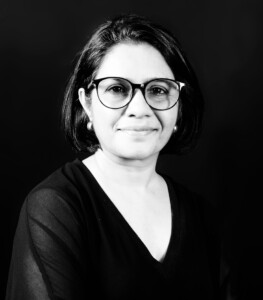 Shweta Ranpura is an architect and urbanist with over 20 years’ experience across geographies, scales and typologies. She is a second-year DDes student and her research investigates design practice through the narratives of climate change. Her research is a comparative study of design practices across geographies through narratives, discourse analysis and speculation as ways to investigate contemporary practices and imagine practices for the future.
Shweta Ranpura is an architect and urbanist with over 20 years’ experience across geographies, scales and typologies. She is a second-year DDes student and her research investigates design practice through the narratives of climate change. Her research is a comparative study of design practices across geographies through narratives, discourse analysis and speculation as ways to investigate contemporary practices and imagine practices for the future.
Shweta has explored architecture, urban design and master planning projects across various design cultures. She has worked as a design director in Bangalore and New York with Gensler, in Singapore, Mumbai and London with BroadwayMalyan as a board director and in Ahmedabad, India with a small practice. Having worked on international projects like the National University Hospital in Singapore, JFK airport in New York and various residential master planning projects, her core interest lies in civic and education typologies.
She has led and co-taught both advanced and introductory design studios and mentored undergraduate research thesis in architecture and urban design at CEPT University in Ahmedabad. Her students have presented their research papers in various seminars and have won excellence awards for best studio projects.
She has earned her March I from University of California, Berkeley and undergraduate degree in architecture from India.
 Katarina Richter-Lunn is an architectural designer, researcher, and doctoral candidate at the Harvard Graduate School of Design. Her research, found at the intersection of design, psychology, and neuroscience, aims to promote well-being through our environment.
Katarina Richter-Lunn is an architectural designer, researcher, and doctoral candidate at the Harvard Graduate School of Design. Her research, found at the intersection of design, psychology, and neuroscience, aims to promote well-being through our environment.
By translating methods of traditional behavioral therapy, her research seeks to demonstrate how human, machine, and spatial interactions can be leveraged via AI algorithms to propose more seamless and intuitive solutions to addressing mental health. As part of this work, she explores how neurological and physiological cues can give insight to one’s behavior, and in turn support cognitive processes through the lens of materiality, computational design, affective computing, and social robotics.
Alongside her doctoral studies at Harvard, Katarina is a research assistant with the Materials Processes and Systems Group (MaP+S) at the GSD, and a member of the Aizenberg Lab at the Wyss Institute for Biologically Inspired Engineering.
Katarina holds a Master in Design Technology (M.Des.) from Harvard GSD and a Bachelor of Architecture (B.Arch) from Cal Poly San Luis Obispo, with a minor in Sustainable Environments. She has worked at leading architecture firms including Snøhetta, Arup, IwamottoScott, and most recently Gehry Partners, where she worked as a project designer. Katarina is a 2022 recipient of the Paul & Daisy Soros Fellowship for New Americans.
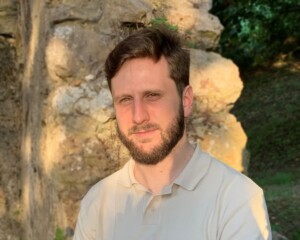 Pedro Rodríguez-Parets Maleras is a second-year Doctor of Design student, architect (B.Arch ’18 and M.Arch ’20), and cultural anthropologist (BA, 2017-now). He holds a Master in Design Studies from Harvard GSD.
Pedro Rodríguez-Parets Maleras is a second-year Doctor of Design student, architect (B.Arch ’18 and M.Arch ’20), and cultural anthropologist (BA, 2017-now). He holds a Master in Design Studies from Harvard GSD.
Pedro explores the interdisciplinary collaboration between anthropologists and designers -ethnographies and projects- to promote culturally sensitive design. His research focuses on the role of architecture in the failure of “development” projects for ethnic minorities and indigenous peoples. He is particularly interested in housing from the perspectives of kinship, political economy, and symbolic anthropology.
Prior to joining the GSD, Pedro studied in Spain (ETSAM Madrid, ETSAV Barcelona, and UNED Madrid), Switzerland (USI Mendrisio), and Chile (PUC, Santiago de Chile). He has worked at Herzog & de Meuron in Basel, and RCR arquitectes in Olot.
 Carolina Sepulveda is a second-year Doctor of Design student. She is an architect, curator, and researcher from Santiago de Chile based in Cambridge, USA. She holds a Master’s degree in Design Studies from Harvard GSD and a B. Arch. from Universidad Catolica de Chile. Carolina is the founder of Sentimental Studio, a research-based architecture practice investigating the built environment through an affective lens. She served as a Consultant at the Housing and Urban Development Division at the Inter-American Development Bank (IADB), managing loans for Chile and Argentina, addressing issues including informal settlements, housing deficit, and gender inclusion.
Carolina Sepulveda is a second-year Doctor of Design student. She is an architect, curator, and researcher from Santiago de Chile based in Cambridge, USA. She holds a Master’s degree in Design Studies from Harvard GSD and a B. Arch. from Universidad Catolica de Chile. Carolina is the founder of Sentimental Studio, a research-based architecture practice investigating the built environment through an affective lens. She served as a Consultant at the Housing and Urban Development Division at the Inter-American Development Bank (IADB), managing loans for Chile and Argentina, addressing issues including informal settlements, housing deficit, and gender inclusion.
She has conducted research and curated architecture exhibitions at Harvard GSD, the IADB, and Chile Architecture Biennial. She also co-curated “Curating Architecture Across the Americas,” a program aimed at showcasing architecture exhibitions across the Americas, promoted by the Harvard David Rockefeller Center for Latin American Studies.
Carolina’s doctoral research examines how queer practices influence urban transformation within Berlin’s radical urban movements, highlighting the interplay between non-heteronormative identities, radical politics, and city-making. Additionally, she is conducting a research project called “Cruising,” granted by the Centre for Urban Studies at the University of Amsterdam.
She is a 2024-2025 fellow at the Harvard Mellon Urban Initiative.

Gulai Shen is a first-year doctoral student at Harvard Graduate School of Design. He focuses his research on building technologies concerning energy, carbon, and indoor environment topics. He is especially interested in applying and incorporating engineering, data science, and optimal control techniques into developing more sustainable buildings that are clean, connected, autonomous, intelligent, and affordable for the planet and people. Gulai has authored multiple first-author articles published in Building and Environment, Energy and Buildings, and other related journals and conferences.
Gulai holds a Bachelor of Science from the University of Illinois, Urbana-Champaign, and a Master of Science from Cornell University, both in Mechanical Engineering. At Cornell, he worked at the Energy and the Environment Laboratory directed by Prof. Max Zhang on data-driven predictive controls for an electric water heater system and IoT hardware for smart water sensing.
Gulai also worked at Nantum AI (formerly Prescriptive Data) as a Building Research Scientist and later as the Lead, AI Research. He was a member of the Research and Development team where he led projects on implementing AI-driven technologies in large building portfolios including Rudin, GSA, JPMC, Boston Properties, and more.
 Annie Simpson is an artist and DDes candidate at the Harvard GSD. She works via sight-/site-based investigation to make videos, photographs, and essays. For the 2024-2025 academic year, Simpson is a Harvard Mellon Urban Initiative Doctoral Fellow. Her dissertation assesses ‘the planetary’ in spatial research through the unique, if curiously unaddressed, aesthetic opportunities provided by it. These openings offer a way to unsettle the dominant visual paradigm of planetary urbanization through essay and film across diverse subjects of the ecological uncanny in Georgia: feral dogs, pine plantations, river snakes, military installations, (the list goes on). Simpson’s practice grounds itself in the Southeastern United States and considers how the region plays a vital role in exporting land and labor relations and material practices globally, vis-a-vis the logics of the plantation. Methodologically, she works by getting lost alongside canine companion-collaborator, Boudreaux.
Annie Simpson is an artist and DDes candidate at the Harvard GSD. She works via sight-/site-based investigation to make videos, photographs, and essays. For the 2024-2025 academic year, Simpson is a Harvard Mellon Urban Initiative Doctoral Fellow. Her dissertation assesses ‘the planetary’ in spatial research through the unique, if curiously unaddressed, aesthetic opportunities provided by it. These openings offer a way to unsettle the dominant visual paradigm of planetary urbanization through essay and film across diverse subjects of the ecological uncanny in Georgia: feral dogs, pine plantations, river snakes, military installations, (the list goes on). Simpson’s practice grounds itself in the Southeastern United States and considers how the region plays a vital role in exporting land and labor relations and material practices globally, vis-a-vis the logics of the plantation. Methodologically, she works by getting lost alongside canine companion-collaborator, Boudreaux.
Simpson is an ongoing contributor to Port Futures & Social Logistics. She received an MFA from the University of Georgia and a BFA from UNC-Chapel Hill; her work has been exhibited internationally and she regularly publishes enviro-spatial criticism and exhibition reviews. In her free time, she builds canoes & rides horses.
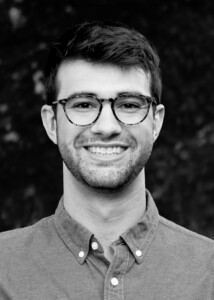 Tom Sterling is third-year doctoral student and a Lecturer in Landscape Architecture at the Harvard Graduate School of Design. Tom’s research is concerned with the epistemological implications of the digital turn in landscape architecture.
Tom Sterling is third-year doctoral student and a Lecturer in Landscape Architecture at the Harvard Graduate School of Design. Tom’s research is concerned with the epistemological implications of the digital turn in landscape architecture.
His recent work and collaborations have been displayed by the Carnegie Museum of Art in Pittsburgh, Pennsylvania; The Cooper Hewitt Smithsonian Design Museum in New York City; and the Royal Scottish Academy in Edinburgh, Scotland. Before joining the DDes program, Tom worked as an exhibition designer, curator, researcher, and designer in Pittsburgh, Cleveland, New York, and Edinburgh.
Tom holds a Bachelor’s degree in Architecture (B.Arch) from Carnegie Mellon University and a Master’s degree in Landscape Architecture (MLA) with distinction from the University of Edinburgh, where he received the Helen A. Rose Prize. Tom has taught architecture and landscape architecture courses at the College of Architecture and Environmental Design at Kent State University, the Boston Architectural College, and The University of Connecticut. In 2025, Tom will begin his appointment as Assistant Professor in Residence at the University of Connecticut in the Department of Plant Science and Landscape Architecture.
 Shining Sun is an architect, second-year doctoral student at the Harvard Graduate School of Design, and founder of ARCHIS Design Studio. She holds dual Master’s degrees in Architecture (MArch II) and Urban Design (MAUD) from the Harvard Graduate School of Design, and a Bachelor’s degree in Architecture (B.Arch) from Cornell University. Shining’s work lies at the intersection of architecture, art, film, and technology. Her current research explores changing author-reader relationships and fragmentary narratives in design.
Shining Sun is an architect, second-year doctoral student at the Harvard Graduate School of Design, and founder of ARCHIS Design Studio. She holds dual Master’s degrees in Architecture (MArch II) and Urban Design (MAUD) from the Harvard Graduate School of Design, and a Bachelor’s degree in Architecture (B.Arch) from Cornell University. Shining’s work lies at the intersection of architecture, art, film, and technology. Her current research explores changing author-reader relationships and fragmentary narratives in design.
Before founding ARCHIS, Shining worked at OMA and AECOM. She has taught at the Central Academy of Fine Arts and Shanghai Jiao Tong University. Her interdisciplinary approach has led to collaborations with artists, scientists, and engineers on numerous experimental projects. Her work has been exhibited at the Shanghai Pudong Art Museum, Pingyao International Film Festival, SpamArt Foundation, and John Hartell Gallery. She is also a member of the Harvard Art Museums’ Asian Curatorial Committee.
Shining has won awards including the 2024 ArchDaily Top 10 Building of the Year in China, Perspective 40 Under 40, International Design Award (IDA, Silver), Bazaar Top 50 Chinese Design Talents, CCA Art Grant, Forbes 30 Under 30, Tatler Gen. T Award for Emerging Architect, WAN APAC Final Shortlist, KPF Paul Katz Fellowship Honorable Mention, Yale University YSOA Chair’s Merit Award, and Canada’s Governor General Award.
Shining’s writings and projects have been published internationally in media including Time + Architecture magazine, Springer Publishing, Architecture & Culture magazine, Archiworld, ArchDaily, Dezeen, Wallpaper, Archinect, etc.
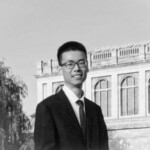 Ehao Wu is an urban designer and a first-year doctoral student at Harvard GSD, specializing in the social, economic, and health impacts of urban transformation through policy intervention, planning and design. His research, which bridges urban science, empirical social science, and economic geography, aims to promote sustainability in urban development, contributing to the creation of healthy, just, and adaptive urban environments.
Ehao Wu is an urban designer and a first-year doctoral student at Harvard GSD, specializing in the social, economic, and health impacts of urban transformation through policy intervention, planning and design. His research, which bridges urban science, empirical social science, and economic geography, aims to promote sustainability in urban development, contributing to the creation of healthy, just, and adaptive urban environments.
Before pursuing his doctorate, Ehao worked as a senior city planner and architect in Shanghai, AISA. His expertise includes revitalizing urban spaces by reusing and employing place-making strategies, especially focusing on transportation hubs, manufacturing lands, and communities within post-industrial cities. He initiated the Sustainable Development Solutions Network (SDSN), an urban redevelopment initiative that effectively integrated academic research with practical planning decisions. Ehao’s design projects have received multiple international accolades, including the UDAD Golden Winner, MUSE Design Awards, London International Creative Competition, and DNA Paris Awards. His academic research on sustainable urban design has been presented in several leading journals and international conferences.
He holds a Master of Philosophy in Urban Studies from the University of Cambridge, a Master of Engineering in Urban Planning and Design from Tongji University, and an undergraduate degree in Architecture.
 Sophia Sufeng Xiao is a third-year doctoral student at the Harvard Graduate School of Design with a background in landscape architecture. Her research focuses on the theories of urban commons as shared resources, open access, and collective governance regimes and how they adapt to the future climate. She is interested in the ethnographic methods to investigate the social aspect of the urban built environment and works as a research assistant for the Critical Landscapes Design Lab at the GSD. She also joined the Data + Feminism Lab at the Department of Urban Studies and Planning, MIT, researching the issues of missing and murdered indigenous people and co-designing the online platform to support healing and justice for indigenous women and communities.
Sophia Sufeng Xiao is a third-year doctoral student at the Harvard Graduate School of Design with a background in landscape architecture. Her research focuses on the theories of urban commons as shared resources, open access, and collective governance regimes and how they adapt to the future climate. She is interested in the ethnographic methods to investigate the social aspect of the urban built environment and works as a research assistant for the Critical Landscapes Design Lab at the GSD. She also joined the Data + Feminism Lab at the Department of Urban Studies and Planning, MIT, researching the issues of missing and murdered indigenous people and co-designing the online platform to support healing and justice for indigenous women and communities.
Prior to the DDes program, Sophia earned a Bachelor of Science in Landscape Architecture with Distinction in Research from Cornell University, minoring in Environmental Science and Sustainability. She received her Master’s degree in Landscape Architecture (MLA) and Design Studies (MDes) in Ecologies from the GSD. She practiced internationally at landscape and architecture firms and won several design competitions and student awards from World Landscape Architecture, the Charette, etc.
In 2022, Sophia worked as an instructor in GSD’s Design Discovery Virtual and In-person programs, teaching design studios, lectures, and seminars. At the GSD, she has been a teaching assistant and academic tutor for Master of Landscape Architecture, contributing to multiple core design studios, ecology courses, and theory seminars.
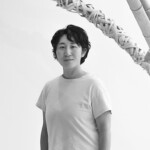 Ayaka Yamashita is a Japanese landscape researcher, cultural producer, and third-year doctoral student at Harvard Graduate School of Design (GSD). Her research explores the intersection of landscape, urbanism, and sound studies, focusing on how sound could provide speculative insights for reimagining future Japanese urban landscapes.
Ayaka Yamashita is a Japanese landscape researcher, cultural producer, and third-year doctoral student at Harvard Graduate School of Design (GSD). Her research explores the intersection of landscape, urbanism, and sound studies, focusing on how sound could provide speculative insights for reimagining future Japanese urban landscapes.
Ayaka holds a Bachelor of Agriculture in International Sustainable Agriculture Development and a Master of Health Sciences in Human Ecology from the University of Tokyo. She completed her Master in Design Studies in Risk and Resilience at Harvard GSD as a Fulbright scholar in 2021, bridging theoretical concepts with practical applications throughout her academic journey.
Ayaka is a co-founder of EDAYA, a crafts and design studio that works in design/art, education, and community engagement. Through EDAYA, she has spent over a decade preserving Kalinga indigenous bamboo musical instruments in the Northern Philippines. This work informs her current research on how nature and local lifestyles are represented through sound.
An experienced fieldworker and community organizer, Ayaka has consulted on Japan International Cooperation Agency projects and teaches international development at the University of Nagano. She is also a trained facilitator, certified as a Facilitator for Change by ChangemakerXchange, organizing global workshops, events, and exhibitions.
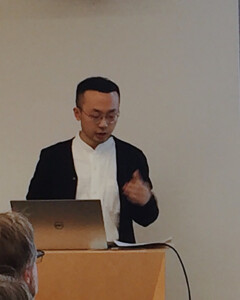 Juncheng “Tony” Yang is an urbanist, technologist, and designer. His research focuses on the intersection of institutional arrangements and emerging technologies in “smart city” governance.
Juncheng “Tony” Yang is an urbanist, technologist, and designer. His research focuses on the intersection of institutional arrangements and emerging technologies in “smart city” governance.
Tony is currently pursuing a doctoral degree at the Harvard Graduate School of Design. He conducts research on tech-driven urban governance at the Data-Smart City Solutions at Harvard Bloomberg Center for Cities and is a Fellow at the Berkman Klein Center for Internet and Society at Harvard Law School. He received a Master of Science in Urbanism from MIT and a Bachelor of Architecture, with distinction and magna cum laude, from Rice University.
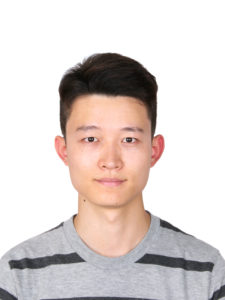 Boya Zhang is a Chinese architect interested in the relation between urban form and the cultural, political, and economic forces. As a Doctor of Design candidate at Harvard Graduate School of Design, Boya has been a member of Office for Urbanization since 2018, where he contributed to a series of design research projects centered around the idea of agrarian modernization. Boya is the co-author of the forthcoming book 50 Species-Towns (Harvard University Graduate School of Design, 2021). His research engages with the global discourse of agrarian urbanism, in particular as a response to the increasingly urgent call for alternative imaginaries of rural futures. His doctoral dissertation focuses on the reception of ideas about the agrarian from the West to China. It aspires to offer an account of history through which the urban-rural transformation in 20th-century China could be understood in a broader theoretical framework beyond the conventional East-West divide. Boya holds a Bachelor of Architecture and a Master of Architecture from Tsinghua University, and a post-professional master’s degree in architecture from Harvard GSD. Prior to pursuing the doctoral degree, he worked for architectural offices in Beijing, Dallas, Los Angeles, and Boston.
Boya Zhang is a Chinese architect interested in the relation between urban form and the cultural, political, and economic forces. As a Doctor of Design candidate at Harvard Graduate School of Design, Boya has been a member of Office for Urbanization since 2018, where he contributed to a series of design research projects centered around the idea of agrarian modernization. Boya is the co-author of the forthcoming book 50 Species-Towns (Harvard University Graduate School of Design, 2021). His research engages with the global discourse of agrarian urbanism, in particular as a response to the increasingly urgent call for alternative imaginaries of rural futures. His doctoral dissertation focuses on the reception of ideas about the agrarian from the West to China. It aspires to offer an account of history through which the urban-rural transformation in 20th-century China could be understood in a broader theoretical framework beyond the conventional East-West divide. Boya holds a Bachelor of Architecture and a Master of Architecture from Tsinghua University, and a post-professional master’s degree in architecture from Harvard GSD. Prior to pursuing the doctoral degree, he worked for architectural offices in Beijing, Dallas, Los Angeles, and Boston.